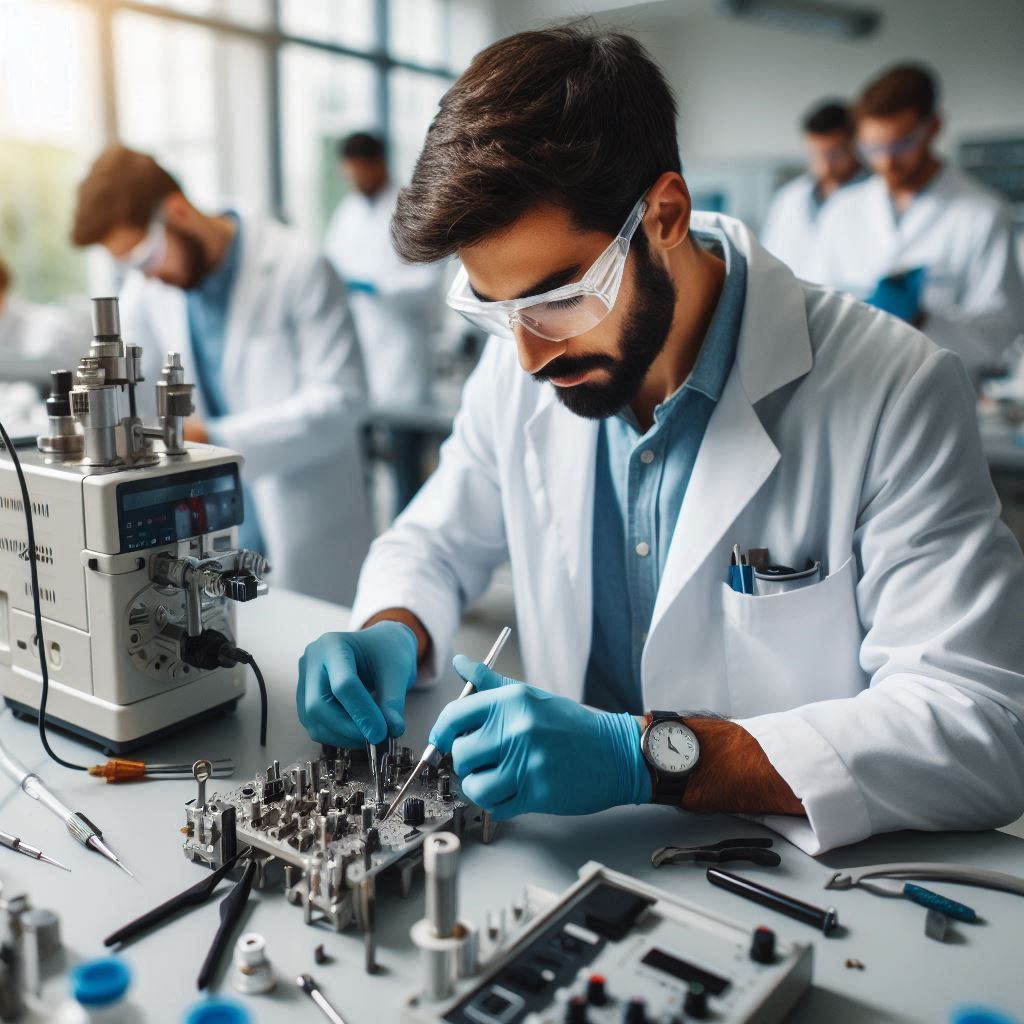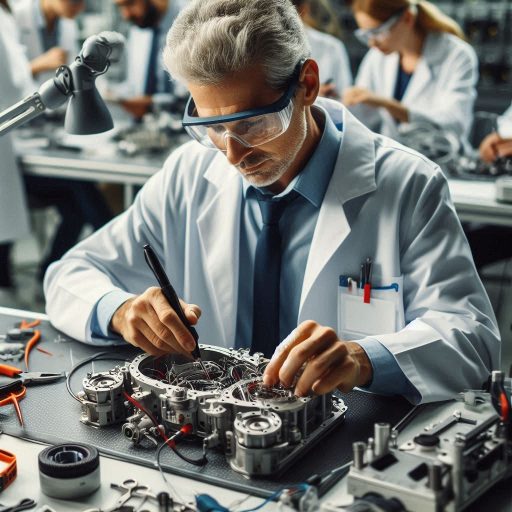Introduction
Biomedical technicians play a critical role in hospital operations.
They maintain, repair, and calibrate medical equipment, ensuring it functions correctly.
These professionals work behind the scenes, but their impact is substantial.
Key Responsibilities of Biomedical Technicians
- Inspect and maintain medical devices to ensure safety and performance.
- Troubleshoot and repair equipment quickly to minimize downtime.
- Calibrate machines for accurate diagnostics and treatment.
Their role is crucial in patient care, directly affecting outcomes.
Without reliable equipment, doctors can’t diagnose or treat effectively.
Biomedical technicians provide this reliability, contributing to efficient hospital operations.
Importance of Biomedical Technicians in Hospital Operations
- They ensure all medical devices meet safety standards.
- Their work reduces equipment failures, saving time and resources.
- They support continuous patient care by keeping equipment in optimal condition.
Hospitals rely on biomedical technicians to maintain a smooth operation.
Their expertise ensures that all medical equipment functions without interruption, supporting the healthcare team‘s mission to deliver quality care.
Responsibilities of Biomedical Technicians
Repair and Maintain Medical Equipment
Biomedical technicians play a crucial role in repairing and maintaining medical equipment.
They respond promptly to equipment failures and malfunctions, ensuring minimal disruption to hospital operations.
By using their technical expertise, they handle a wide range of devices, from imaging machines to patient monitors.
Regular maintenance prevents breakdowns and extends the lifespan of medical equipment, contributing to uninterrupted patient care.
Calibrate and Test Equipment for Accuracy and Safety
Another vital responsibility of biomedical technicians is to calibrate and test equipment for accuracy and safety.
They perform routine calibrations to ensure that machines like ventilators and infusion pumps deliver precise readings.
Testing procedures verify that equipment functions within the specified safety parameters, reducing the risk of errors in patient treatment.
Accurate and safe equipment is crucial for effective medical interventions.
Troubleshoot and Diagnose Equipment Malfunctions
Biomedical technicians excel in troubleshooting and diagnosing equipment malfunctions.
When equipment exhibits issues or fails, they use their skills to identify the underlying problems quickly.
Whether dealing with mechanical failures, software issues, or user errors, they provide effective solutions to restore functionality.
Their ability to diagnose and address malfunctions promptly helps maintain a seamless workflow in hospitals and supports consistent patient care.
Basically, biomedical technicians are essential to hospital operations through their responsibilities: repairing and maintaining equipment, calibrating and testing for accuracy and safety, and troubleshooting and diagnosing malfunctions.
Their work ensures that medical devices are reliable, accurate, and safe, which directly impacts the quality of patient care.
Read: Top CAD Software for Aspiring CAD Technicians
Collaboration with Healthcare Professionals
Work Closely with Doctors, Nurses, and Other Staff Members
Biomedical technicians collaborate closely with doctors, nurses, and other healthcare professionals to ensure seamless operations.
Their interaction with these staff members is crucial for effective patient care.
By maintaining open lines of communication, they address any concerns related to medical equipment.
This teamwork fosters a better understanding of how equipment impacts patient treatment and facilitates a coordinated approach to healthcare delivery.
Support for Using and Understanding Equipment
Another important aspect of their role involves providing support for using and understanding equipment.
Biomedical technicians offer training sessions and guidance to medical staff on how to operate complex devices safely and effectively.
They explain the functions and features of various medical tools, ensuring that healthcare professionals can use them correctly.
This support helps prevent user errors and enhances the overall efficiency of medical procedures.
Ensure Equipment is Functioning Properly for Patient Care
Ensuring that equipment is functioning properly for patient care is a primary responsibility of biomedical technicians.
They perform regular checks and maintenance to confirm that devices are in optimal working condition.
Their proactive approach helps to prevent equipment failures that could disrupt patient care.
By keeping medical equipment reliable and safe, they support the delivery of high-quality care and improve patient outcomes.
Generally, biomedical technicians play a vital role in collaborating with healthcare professionals.
They work closely with doctors, nurses, and other staff members, provide essential support for using and understanding equipment, and ensure that all medical devices function properly.
Their contributions are key to maintaining efficient hospital operations and delivering excellent patient care.
Read: How to Become a CAD Technician: Step-by-Step Guide
Importance in Improving Patient Care
Ensure Medical Equipment is Reliable and Accurate
Biomedical technicians are essential in ensuring that medical equipment is reliable and accurate.
They perform regular maintenance and calibration to confirm that devices like MRI machines and infusion pumps function correctly.
Reliable equipment provides precise readings and consistent performance, which is crucial for accurate diagnosis and effective treatment.
Their work directly impacts the quality of patient care by ensuring that medical tools are dependable.
Minimize Downtime of Equipment for Uninterrupted Patient Care
Another critical role of biomedical technicians is to minimize downtime of equipment, ensuring uninterrupted patient care.
They respond quickly to malfunctions and perform necessary repairs to keep devices operational.
By addressing issues promptly, they prevent prolonged equipment outages that could delay patient treatments.
This proactive approach helps maintain a steady flow of care and reduces the risk of interruptions in critical medical procedures.
Keep Up-to-Date with New Technology to Improve Healthcare Outcomes
Biomedical technicians also stay up-to-date with new technology to improve healthcare outcomes.
They continuously learn about advancements in medical equipment and integrate these innovations into hospital settings.
Their knowledge of the latest technologies enables them to recommend and implement improvements that enhance patient care.
Keeping abreast of technological developments ensures that healthcare facilities benefit from the most advanced tools available, leading to better treatment options and outcomes.
In short, biomedical technicians play a pivotal role in improving patient care by ensuring that medical equipment is reliable and accurate, minimizing downtime, and staying current with technological advancements.
Their efforts help provide high-quality, uninterrupted care and contribute to better healthcare outcomes through the effective use of the latest medical technologies.
Read: Surveying and Mapping Technician Internships: A Guide
Transform Your Career Today
Unlock a personalized career strategy that drives real results. Get tailored advice and a roadmap designed just for you.
Start Now
Training and Education Requirements
Typically Require an Associate’s Degree in Biomedical Technology
To become a biomedical technician, candidates typically require an associate’s degree in biomedical technology or a related field.
This educational background provides foundational knowledge in medical equipment, electronics, and mechanical systems.
An associate’s degree program covers essential topics such as biomedical instrumentation, electronics, and clinical engineering.
This formal education prepares technicians for the technical challenges they will face in the field.
Hands-On Training and Certification May Be Necessary
Hands-on training and certification are also crucial for biomedical technicians.
Practical experience allows them to apply theoretical knowledge to real-world scenarios.
Many programs include internships or on-the-job training opportunities to gain practical skills.
Additionally, certification from professional organizations, such as the Biomedical Equipment Technician (BMET) certification, can enhance job prospects and demonstrate competency in the field.
Certification often requires passing an exam and meeting specific experience criteria.
Continuing Education to Stay Current with Advancements in the Field
Continuing education is essential for biomedical technicians to stay current with advancements in the field.
Technology in healthcare evolves rapidly, and technicians must keep up with new developments to maintain their skills.
Ongoing training and professional development opportunities, such as workshops and seminars, help them stay informed about the latest medical equipment and techniques.
By participating in continuing education, technicians ensure they remain proficient and capable of handling new technologies and challenges.
In review, the training and education requirements for biomedical technicians include obtaining an associate’s degree in biomedical technology, acquiring hands-on training and certification, and engaging in continuing education.
These steps ensure that technicians are well-prepared to handle the demands of their role and stay up-to-date with advancements in medical technology.
Read: Impact of Drones on Surveying and Mapping
Safety Compliance and Regulations
Ensure All Equipment Meets Safety Standards
Biomedical technicians play a crucial role in ensuring that all equipment meets safety standards.
They conduct thorough inspections and maintenance to verify that medical devices comply with established safety regulations.
By adhering to these standards, they help prevent accidents and ensure that equipment operates safely for both patients and healthcare providers.
Compliance with safety standards is essential for maintaining a safe hospital environment and providing high-quality patient care.
Stay Informed on Regulatory Requirements for Medical Equipment
Staying informed about regulatory requirements for medical equipment is a key responsibility for biomedical technicians.
They must be knowledgeable about various regulations and guidelines set by organizations such as the FDA and other regulatory bodies.
This awareness ensures that all equipment meets the latest compliance standards and legal requirements.
By keeping up-to-date with these regulations, technicians contribute to the safe and effective use of medical technology in healthcare settings.
Document Maintenance and Repair Activities for Compliance Purposes
Documenting maintenance and repair activities is crucial for compliance purposes.
Biomedical technicians maintain detailed records of all inspections, repairs, and calibrations performed on medical equipment.
These records provide evidence of adherence to safety standards and regulatory requirements.
Accurate documentation supports audits and inspections and helps ensure that the hospital meets legal and accreditation standards.
Proper record-keeping is essential for maintaining compliance and ensuring accountability in equipment management.
All in all, safety compliance and regulations are integral to the role of biomedical technicians.
They ensure that all equipment meets safety standards, stay informed on regulatory requirements, and document maintenance and repair activities for compliance purposes.
Their efforts help maintain a safe and regulated environment, supporting effective and reliable patient care.
See Related Content: Mining Engineer Salary: How Much Can You Earn?
Cost-Effectiveness and Efficiency
Regular Maintenance Can Prevent Costly Equipment Breakdowns
Regular maintenance performed by biomedical technicians is crucial in preventing costly equipment breakdowns.
Routine inspections and servicing help identify potential issues before they escalate into major problems.
By addressing minor repairs and performing preventive maintenance, technicians avoid unexpected equipment failures that can lead to expensive repairs and downtime.
This proactive approach saves hospitals money and ensures that critical medical devices remain operational.
Properly Functioning Equipment Can Improve Efficiency of Hospital Operations
Properly functioning equipment significantly enhances the efficiency of hospital operations.
When medical devices work correctly, healthcare providers can perform procedures and deliver treatments without delays or interruptions.
Efficient equipment use streamlines workflows, reduces wait times, and improves overall patient throughput.
Technicians ensure that all devices are in optimal condition, which directly contributes to smoother and more effective hospital operations.
Assist in Budgeting for Equipment Upgrades and Replacements
Biomedical technicians also play a key role in assisting with budgeting for equipment upgrades and replacements.
They provide valuable insights into the condition of existing equipment and recommend when upgrades or replacements are necessary.
Their expertise helps hospital administrators plan and allocate resources effectively.
By providing accurate assessments and forecasts, technicians support informed financial decisions and ensure that the hospital invests in reliable and up-to-date technology.
Essentially, the cost-effectiveness and efficiency of hospital operations benefit greatly from the work of biomedical technicians.
Regular maintenance prevents costly breakdowns, properly functioning equipment improves operational efficiency, and technicians assist in budgeting for necessary upgrades and replacements.
Their contributions help hospitals manage resources effectively and provide high-quality patient care.
Emergency Response and Disaster Preparedness
Be Prepared to Troubleshoot and Repair Equipment During Emergencies
Biomedical technicians must be prepared to troubleshoot and repair equipment during emergencies.
Their role becomes crucial when unexpected failures occur, as they need to act quickly to address issues.
In high-pressure situations, such as during critical procedures or mass casualty incidents, their ability to swiftly diagnose and fix equipment problems is vital.
This readiness helps ensure that medical devices remain operational when they are needed most.
Ensure Critical Equipment is Functioning in Any Situation
Ensuring that critical equipment functions properly in any situation is a core responsibility for biomedical technicians.
They conduct thorough checks and maintain essential devices like ventilators, defibrillators, and monitors to ensure reliability during emergencies.
By keeping this equipment in top working condition, they contribute to the hospital‘s ability to provide effective care under all circumstances, including during crises or natural disasters.
Collaborate with Other Hospital Staff for Disaster Response Planning
Collaboration with other hospital staff is key for effective disaster response planning.
Biomedical technicians work closely with emergency response teams, administrators, and clinical staff to develop and implement disaster preparedness strategies.
Their input helps ensure that equipment needs are addressed in the planning stages, and that procedures for rapid repair and maintenance are established.
This teamwork enhances the hospital‘s overall readiness and effectiveness during emergencies.
In summary, biomedical technicians play a vital role in emergency response and disaster preparedness.
They must be ready to troubleshoot and repair equipment under pressure, ensure that critical devices function reliably in any situation, and collaborate with other hospital staff to plan for disasters.
Their efforts help maintain operational continuity and support effective patient care during emergencies.
Conclusion
The Vital Role of Biomedical Technicians in Hospital Operations
Biomedical technicians are essential for the smooth operation of hospital environments.
They ensure that medical equipment functions efficiently and safely, performing regular maintenance and urgent repairs to prevent equipment failures.
Their expertise extends to keeping technology up-to-date, which is vital for accurate diagnostics and effective treatments.
By managing the operational status of medical devices, technicians help avoid disruptions that could delay patient care.
Additionally, they provide crucial training for hospital staff on proper equipment use and troubleshooting, further supporting the seamless functioning of hospital operations.
The Impact They Have on Patient Care and Overall Healthcare Delivery
Biomedical technicians significantly impact patient care by ensuring that medical equipment is reliable and safe.
Their work directly influences patient outcomes by preventing equipment-related errors and ensuring that devices perform as expected.
Reliable equipment supports precise diagnostics and effective treatments, which are crucial for patient health.
Their role in maintaining and updating technology also enhances overall healthcare delivery, allowing hospitals to provide advanced and high-quality care.
By ensuring that medical equipment is always operational, biomedical technicians play a key role in improving patient safety and optimizing healthcare services.
[E-Books for Sale]
The Big Book of 500 High-Paying Jobs in America: Unlock Your Earning Potential
$19.99 • 500 High-Paying Jobs • 330 pages
Explore 500 high-paying jobs in America and learn how to boost your career, earn more, and achieve success!
See All 500 High-Paying Jobs of this E-Book
1001 Professions Without a Degree: High-Paying American Jobs You Can Start Now
$19.99 • 1001 Professions Without a Degree • 174 pages
Discover 1001 high-paying jobs without a degree! Unlock career tips, skills, and success strategies for just $19.99!




